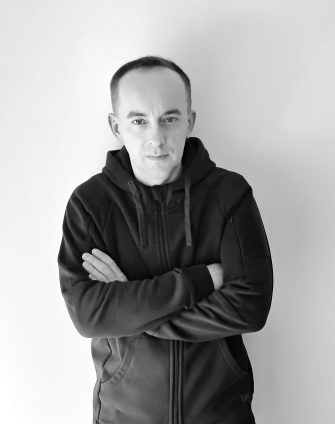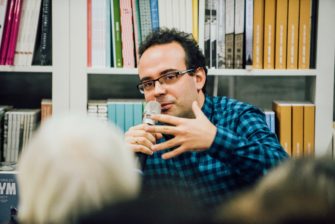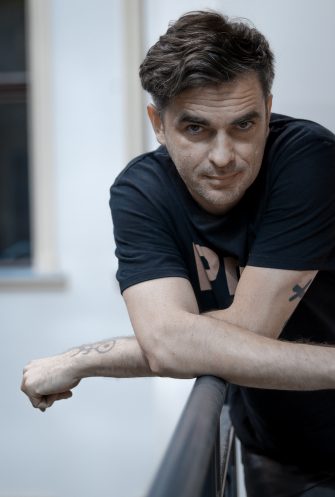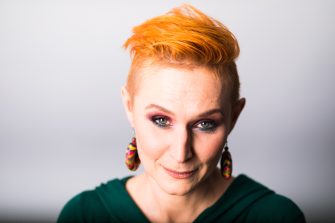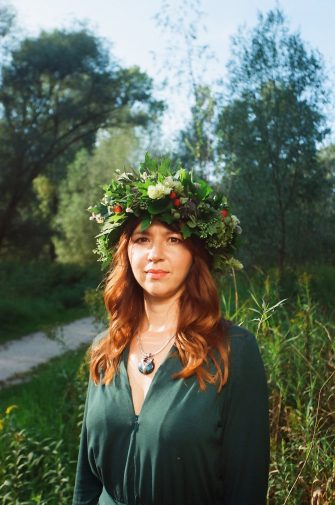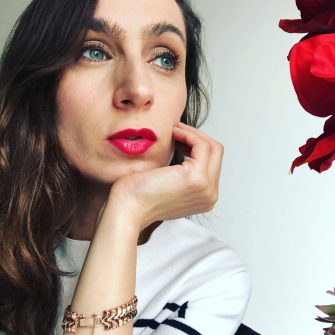Nazywam się Zośka Papużanka. Kilka lat temu postanowiłam zacząć pisać książki i chyba to była nie najgorsza decyzja. Zadebiutowałam w roku 2012 w wydawnictwie Świat Książki powieścią „Szopka”. Moja pierwsza książka przyniosła mi duże uznanie czytelników i krytyki, a największymi wyróżnieniami były nominacje do Nagrody Literackiej Nike oraz do Paszportów Polityki.
W roku 2016 wydawnictwo Znak opublikowało moją drugą powieść, „On”, która przyniosła mi kolejną nominację do Paszportów Polityki i do Ogólnopolskiej Nagrody Literackiej dla Autorki Gryfia, oraz wyróżnienie w postaci tytułu Krakowskiej Książki Miesiąca. W 2017 roku opublikowałam zbiór opowiadań pod tytułem „Świat dla ciebie zrobiłem”. W 2020 roku ukazała się, tym razem w wydawnictwie Marginesy, trzecia powieść, nosząca tytuł „Przez”; rok 2021 przyniósł wydanie powieści „Kąkol”, nad którą pracowałam dzięki Stypendium Twórczemu Miasta Krakowa, otrzymanym w roku 2019. W czerwcu 2023 roku wydawnictwo Marginesy opublikowało „Żaden koniec”.
W międzyczasie uczestniczyłam w wielu spotkaniach autorskich oraz wydarzeniach związanych z literaturą: w Festiwalu Debiutów w Kilonii, Festiwalu Conrada, Miesiącu Spotkań Autorskich w kilku europejskich miastach, Zakopiańskim Festiwalu Literackim, Ełckim Festiwalu Literatury i Muzyki. Byłam gościem licznych programów telewizyjnych i radiowych – dostępne linki, pod którymi można znaleźć nagrania, zamieszczam w jednym z dokumentów. Zostałam stypendystką programu Instytutu Genshagen dla twórców i tłumaczy. W listopadzie 2020 roku prowadziłam warsztaty literackie w ramach Festiwalu Młodych Twórców. W czasie pandemii napisałam szesnaście odcinków internetowego miniserialu „W związku z zaistniałą sytuacją”, w którym zagrała Agnieszka Przepiórska-Frankiewicz oraz wielu znanych aktorów i ludzi kultury. Serial, zrealizowany przy wsparciu Teatru Łaźnia Nowa, cieszył się bardzo dużym powodzeniem i zebrał świetne recenzje, których zwieńczeniem była Nagroda Teatralna im. Stanisława Wyspiańskiego.
Opowiadania publikowałam w Tygodniku Powszechnym, Radarze, Piśmie, Miesięczniku Znak, Vogue, Czasie Literatury. Napisałam kilka felietonów dla Gazety Wyborczej, w New Eastern Europe drukowałam recenzje literackie, współredagowałam też numery poświęcone Krakowowi oraz twórczości Tadeusza Kantora. Współpracuję z teatrami dla dzieci – dla nieistniejącego już teatru Parawan napisałam teksty piosenek do kilku przedstawień, współpracuję również z Teatrem Figur Kraków. Jestem autorką tekstu monodramu „Kocham Bałtyk”, w którym występuje Agnieszka Przepiórska-Frankiewicz.
Starałam się dzielić życie pisarki z obowiązkami naukowymi – w czasie pomiędzy pisaniem powieści obroniłam w Uniwersytecie Pedagogicznym w Krakowie pracę doktorską, dotyczącą recepcji sztuk teatralnych Federica Garcii Lorki na scenach polskich. Uczę z wielką przyjemnością języka polskiego. I nadal chcę pisać.
Recenzje
,,Szopka”
Zośka Papużanka z niezwykłą lekkością żongluje słowami, by w sposób anegdotyczny i satyryczny opisać małostkowość i teatralność życia pewnej rodziny. Ironia, wyolbrzymienia i powtórzenia służą uwydatnieniu absurdów codzienności przedstawianych w postaci licznych scenek rodzajowych. Papużanka prezentuje obraz rodziny na pozór przeciętnej – przecież nie ma tu przemocy czy alkoholizmu. I właśnie w tę przeciętność wbija ostry szpikulec. Pokazuje dom, w którym podstawowe wartości ulegają dziwnej mutacji. -Urszula Pawlicka dwutygodnik.com
Narracja “Szopki” wciąga od pierwszej strony. Warto jednak choć na chwilę od niej się oderwać, żeby skierować uwagę na warsztat autorki. W sekwencji kilku ciętych, poniekąd dosadnych zdań, kreśli pisarka wyrazistą sylwetkę jednej z głównych bohaterek. […] Trzeba przyznać, że pisarka wykazuje się wprost nieznośną lekkością pióra, mimo ciężaru materii. Czytelnikom pozostaje śledzenie poczynań bezkompromisowo portretowanych bohaterów, czemu towarzyszy uzależniający jak narkotyk, osobliwy dreszcz emocji. -Janusz R. Kowalczyk, culture.pl
Po co tu się strzępić jeszcze nad problemami w książkach, gdy wszystko może tak ładnie spłynąć niebieską poświatą z telewizora? Czemuż i to Papużanki nic a nic nie przestraszyło? Cóż takiego jeszcze dostrzegła w tym domu, jakże normalnym, ale jakoś tak nienormalnym, żeby wieczorem po pracy, po odłożeniu dzieci do łóżeczek jeszcze o tym pisać? Zobaczyła pozór, zamiatanie pod dywan i kumulację nieszczęść, wieloletnie przyklepywanie. Zobaczyła niedocenienie rozmowy, marność żywota ludzkiego, groteskę i śmieszność, ale też łzy i smutek. Ale przecież to jeszcze nie cud i talentu do tego nie trzeba, do ważnych literackich nagród za takie spostrzeżenia również nie nominują. Łatwo było wpaść w powtórzenia, wtórności i marnieć słabym debiutem, na lichym przecież tle polskiej prozy XXI wieku. I tu się właśnie w Papużance odezwała mała rewolucjonistka. -Bartłomiej Krzysztan, esensja.pl
”On”
Papużanka pochyla się nad bezradnością, kiedy nie można stawić oporu wiecznym utyskiwaniom. Penetruje te rejony świadomości, z którymi nawiązujemy kontakt dopiero po latach. „On” jest wiarygodną prozą socjologiczną i psychologiczną. Napisaną z pewną wyczuwalną manierą i sznytem, ale do końca konsekwentną – w związku z tym druga powieść Zośki Papużanki wyróżni się na rynku wydawniczym, bo śmiem podejrzewać, iż autorka nie potrafi pisać tak, by w ów rynek się wtopić. – Jarosław Czechowicz
Zośka Papużanka zdecydowała się w “Onym” na powrót do lat 80. oglądanych z dziecięcej – choć niedziecinnej – perspektywy. Bardzo zabawnie i celnie opisała tamte czasy, a szczególne brawa należą jej się za obraz mikrokosmosu ówczesnej szkoły podstawowej, w którym odnajdą się bez wątpienia wszyscy pobierający nauki w tatmych czasach. […] Dużo częściej dochodzi tu jednak poczucie humoru, mocno ironiczne, ale nie złośliwe. “On” przynosi ciepłą, choć bynajmniej nie naiwną, wizję świata, przesyconą realizmem magicznym w wersji z przymrużeniem oka. – Aleksandra Lipczak, culture.pl
„On” jest bardzo sprawnie napisaną książką, która pozwala rozkoszować się plastycznymi opisami tak dobrze nam znanych uczniowskich wyczynów. Podejmuje ona również ważne tematy. – Urszula Kuczyńska
”Świat dla ciebie zrobiłem”
Książka Papużanki jest studium podejmowanego wciąż na nowo trudu dowiedzenia, że człowiek nie jest skazany na samotność. Wykorzystując tak pojemną formułę, pisarka eksperymentuje z rozmaitymi rejestrami języka. Mamy tu parodię kulinarnych mód („Demerara”), miniaturowy thriller sąsiedzki („Szkoda”), pastisz biblijnej opowieści („Daleko”) i historyczną stylizację („Ślady”). Zdarzają się opowiadania, które grzęzną w kliszach („Spotkałem opowiadanie”) albo stanowią tylko przymiarki do dłuższych narracji („Stracciatella”). Jednak w zdecydowanej większości Papużanka tworzy skończone miniatury, w których na niewielkiej przestrzeni udaje się jej w pełni wyzyskać narracyjne napięcie. Można się tylko cieszyć, że sztuka opowiadania powraca u nas do łask. – Maciej Jakubowiak, polityka.pl
Zośka Papużanka z wyobraźnią balansuje pomiędzy jawą a fikcją. Ale też nie ogranicza się do li tylko do przygód mieszczuchów. W opowiadaniu „Ślady” odwołuje się do dawniejszych obyczajów, zaś pierwsze zdanie – „Nieprawda, że pamięta się wigilie” to znakomity początek historii. A jej koniec? No właśnie. „Świat dla ciebie zrobiłem” mówi jeden z jego bohaterów. Zośka Papużanka tworzy wspomniany tuzin światów, wspomina relacje z rodzicami, z bliskimi,a wszystko po to, by przypomnieć, że sami stanowimy cząstki świata, które ona umie ułożyć w opowiadania. – Jerzy Doroszkiewicz, poranny.pl
W kameralnych opowiadaniach Zośki Papużanki, prezentowanych w najnowszej książce autorki Świat dla ciebie zrobiłem, dominują dwa sprzeczne żywioły: refleksyjny i satyryczny. Ten pierwszy tworzy swoistą klamrę zbioru, który zaczyna się i kończy narracjami o niemal metafizycznym zacięciu, niejasnymi, enigmatycznymi, nawiązującymi do konwencji mitograficznej. – Wojciech Rusinek
”Przez”
Proza Zośki Papużanki zawiera nieczęsto spotykany walor. Snując nić narracji, pisarka przeplata ją niekiedy cienkim wątkiem komentarza: (“dystans i takie tam. Umiejętność kpienia z siebie, autodowcip, egoironia. Liczy się wnętrze, wnętrze, Sokratesie”). Niektóre bogate w metafory opisy dodatkowo skłaniają autorkę do ujawnienia swojego stosunku do nich, nęcąc czytelniczą wyobraźnię swoistym blamażem, np. zaprzeczaniem samej sobie, choćby w krytyce schematów, z zastosowaniem tychże schematów: (“nie umiem mówić o takich rzeczach, zresztą nikt nie umie, zawsze wychodzi dziecinada, jeszcze gorzej, gdyby napisać. Niektórzy piszą to w książkach i biorą za to kasę, bezwstydnicy”). -Janusz R. Kowalczyk, culture.pl
Autorka stopniowo odsłania przeciętną historię zwykłych ludzi. Pierwsze spotkanie, wyreżyserowane tak, aby raziło spontanicznością, jednostronnie definiowane oczekiwania, potykanie się o drobiazgi, które urastają do rangi problemu, ja zamiast my. Znamy to? Przez bieżącą narrację sprowadzającą się do codziennej rutyny obserwowania i fotografowania przebijają urywki wspomnień, z których powoli układam odpowiedź na narzucające się pytania. – Adam Słupski, Magazyn Literacki ,,Książki”
Przez Zośki Papużanki to proza bez reszty skupiona na detalu. Autorka wydobywa z cienia wszystko to, czego na co dzień nie dostrzegamy. Pojedyncze słowa. Gesty. Sceny, do których nie przywiązujemy najmniejszego znaczenia, a które decydują o kierunku, w jakim zmierza nasze życie. Bo życie – w przeciwieństwie do literatury czy kina – nie składa się z wielkich scen, którym towarzyszy pompatyczna muzyka, z potężnych dramatów czy wielkich tragedii. Raczej z pozornych drobnostek i maleńkich pęknięć, które mogą doprowadzić do całkowitego zniszczenia tak starannie budowanego przez nas mikrokosmosu. Związku. Domu. Rodziny. – Sławomir Krempa, granice.pl
Wywiady
– Co dla pani jest najważniejsze w opowiadaniu?
– Lubię drobiazg. Przedmiot, zdanie. Lubię myśleć o pewnej sekwencyjności, o tym, że coś się powtarza, wraca.
Kiedy piszę, jestem w świecie, o którym piszę. Zupełnie wyłączam się na to, co na zewnątrz, nie można mnie dotknąć, zawracać mi głowy, bo się odwracam ze wściekłością, wybijam z rytmu, gubię temat i mogę być nieprzyjemna dla tego, kto mi przerwał. Jedyne czego potrzebuję w czasie pisania, to ciszy. Jestem słuchowcem, bardzo mi przeszkadzają dźwięki, najchętniej pisałabym w namiocie tlenowym. Kiedy wychodzę z tamtego świata, kiedy książka idzie do redakcji, zapominam o niej. Nie mam żadnego stosunku do bohaterów, z żadnym z nich nie chciałabym pójść na wino. Nie wiem, co dalej z nimi będzie, i nie interesuje mnie to. Ich historia się skończyła, gdy ją napisałam. Reszta już nie jest moją sprawą. Reszta jest sprawą czytelnika. kultura.onet.pl

